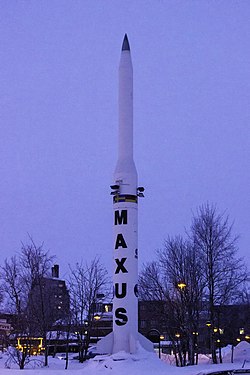Maxus (space program)
The MAXUS program is a joint venture between Astrium and the Swedish Space Corporation for material analysis under conditions of microgravity . For this, a corresponding payload with a will Castor-4B - sounding rocket from Esrange - rocket launch site in Sweden started. All MAXUS launches were carried out with the support of the mobile missile base of the German Aerospace Center (DLR).
With Maxus, examinations can be performed in up to twelve minutes and 40 seconds of microgravity while the capsule is in free fall .
The 1.02 meter diameter and 15.50 meter long rocket has a launch mass of 12,300 kg. With its starting thrust of 450 kN, it can bring a payload of up to 720 kg to a peak height of 850 km. The payload of each capsule consists of up to eight different experiments. The capsule can be retrieved and reused after re-entry .
Start list
| date | Starting place | rocket | mission | Results |
|---|---|---|---|---|
| May 8, 1991 | Esrange | Castor 4B | MAX 1 | Partial success, summit height 154 km |
| November 8, 1992 | Esrange | Castor 4B | MAXUS 1B | Success, summit height 717 km |
| November 29, 1995 | Esrange | Castor 4B | MAX 2 | Success, summit height 706 km |
| November 24, 1998 | Esrange | Castor 4B | MAX 3 | Success, summit height 713 km |
| April 29, 2001 | Esrange | Castor 4B | MAX 4 | success |
| April 1, 2003 | Esrange | Castor 4B | MAX 5 | success |
| November 22, 2004 | Esrange | Castor 4B | MAX 6 | success |
| May 2, 2006 | Esrange | Castor 4B | MAX 7 | success |
| March 26, 2010 | Esrange | Castor 4B | MAXUS 8 | success |
| April 7, 2017 | Esrange | Castor 4B | MAX 9 | success |
See also
Web links
- Sounding rockets ( Memento from November 1, 2013 in the Internet Archive ) - EADS Astrium
- Maxus in the Encyclopedia Astronautica (English)
- ESA: High ride with Maxus-8 (English)
Individual evidence
- ↑ 12 minutes of weightlessness. German Aerospace Center, April 7, 2017, accessed April 7, 2017 .
